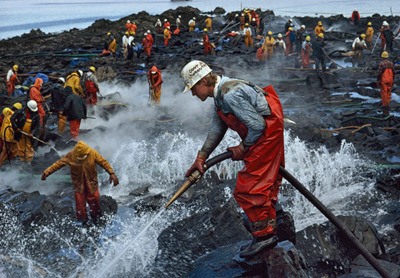March 24, 1989, is a 25th anniversary that is anything but silver. It’s an oily black remembrance of destruction and despair.
Friday Harbor’s David Nash and Lynn Danaher certainly aren’t celebrating. Their lives and livelihoods were forever altered on that date. They remember it well, but not with fondness. Far from it.
“It broke my heart to leave my home in Halibut Cove,” Danaher said, tears welling up as she recounted how everything changed after the Exxon Valdez oil spill. She had been making about $60,000 a year before 1989, sometimes more. In 1989-1990, she made $18,000 working as part of the cleanup crew.
“I learned from Exxon that corporations run this country, including the Supreme Court,” David Nash said. “God help us if something like that happens down here.”
At least 11 million gallons of oil and perhaps as many as 25 million gallons were spilled. Several estimates say that 20,000 gallons or more of the spill still pollute Prince William Sound and nearby beaches.
Countless living things, including 140 bald eagles, 22 orcas and as many as a quarter million birds died within days of the spill, and many more in the weeks that followed. Pawnation.com estimates that “small organisms were killed by the trillions.” Oceana, a conservation organization, reports that some species of loons, salmon, seals, ducks, herrings, pigeons, mussel and clam populations have never fully recovered.
Exxon eludes hefty payout
Exxon spent over $3.8 billion to clean up some of the oil, compensate 11,000 residents and fishermen and pay fines. However, it could have been $4.5 billion more.
The Alaskan court ordered Exxon to pay $5 billion in punitive damages in 1994. After 14 years of lawsuits and appeals, the U.S. Supreme Court ruled that Exxon only owed $507.5 million – about 12 hours of revenue for the giant oil company, according to Larry West in the About.com Guide to the Environment.
Danaher was active in the lawsuits.
“The depositions were a high-level form of harassment by Exxon lawyers, driven by money,” she said. “They tried to discredit my experience, my life. It was horrific, and it went on for 21 years. And Exxon never took responsibility and the courts allowed them to do that.”
Hundreds of claims are still not paid and many claimants have died – their heirs can claim the payments. Many fishing license holders, including apparently Todd and Sarah Palin, did not file claims. “The pair was among the nearly 1,000 plaintiffs who have not claimed their payouts on a list released last week by managers of the settlement fund,” wrote Yereth Rosen in a Reuters news dispatch.
As many as 150 islanders, including 20 from the Nash family alone, fished in Alaskan waters at various times before Exxon Valdez. Nash family members fished the Cook Inlet area north of Prince William Sound. Those fishing grounds were heavily polluted with oil.
Island ties severed
Paul and David Nash first started going to Alaska at age 12 and fished for an Alaska cannery from age 15 for several years before they bought their own boats.
Neither David nor Paul fish Alaska any longer, though both still own boats and still fish local runs.
“I could make $200,000 per year from fishing in a good year,” David Nash said. “I got less than $100,000 from the Exxon settlement.”
Although both love being on the water and are skilled boat handlers and fishermen, fishing isn’t an idyllic pastime for either.
“We fished because that’s what we knew, that’s what we did,” David said. “It was hard work, and dangerous if you didn’t know what you were doing. After Exxon Valdez in Alaska and the Boldt decision here, it just isn’t the same anymore.”
Born and raised in Portland, Ore., Lynn Danaher homesteaded in Alaska for five years and fished there for 14 years until 1994. She was a set-net fisherman in Halibut Cove, where she lived during the fishing season, just around the corner from Prince William Sound.
Danaher recently reflected about her years in Alaska, almost poetic, plainly emotional, in a long interview.
“It was an extraordinarily beautiful place and we appreciated where we were and what we did,” she said. “The fishery was a well-managed fishery since the 1970’s, with balanced management that preserved the resource for everyone. And we all played by the rules. Everyone who knew what they were doing and worked hard, as I did, could make money from the runs. I got $47,000 from Exxon – what a joke – and lost 80 percent of my investment in my gear and licenses when I finally sold out in 1994 and came to Friday Harbor for good. A few of my Alaska friends did well and I’ve done okay, but our lives have changed. The dynamic of the fishery, and of life, changed. It will never be the same again.”
Lessons learned?
The Nashes and Danaher had different attitudes about fishing, and different responses to the spill and the aftermath, but all feel cheated out of their lives and livelihoods.
“At the end of the day, we must remain vigilant here,” said Danaher, who helped found the Friday Harbor Film Festival as, in part, a documentary showcase to stress local environmental matters. “Oil and coal ships are already here. We can’t stop them, but they must have escort tugs and double hulls.”
Although the Prince William Sound fishery, as it was, is a distant memory, according to David Nash there are lessons from the Exxon Valdez oil spill that still apply today.
“They said it wouldn’t happen there and I believed them,” he said. “I don’t believe them anymore.”




